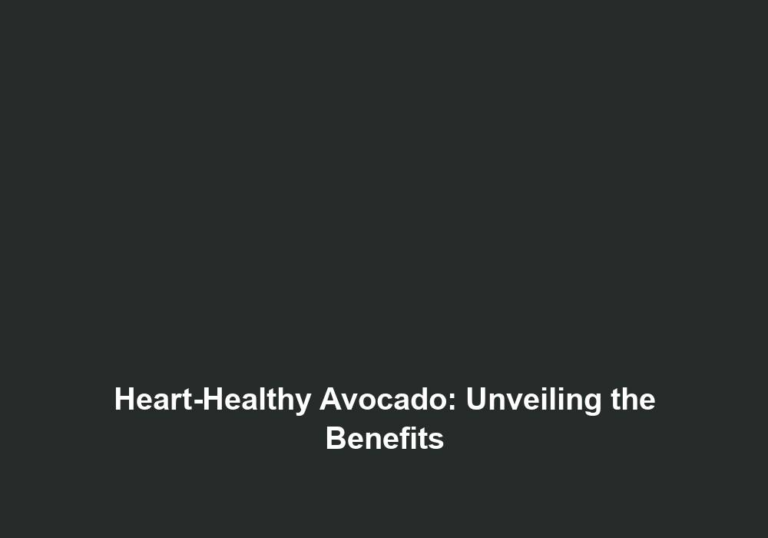Nutritional Science and Heart Health: The Superfood Connection
Good nutrition plays a crucial role in maintaining a healthy heart. The field of nutritional science has made significant strides in understanding the impact of food on heart health. In this article, we will explore the superfood connection and how incorporating nutrient-rich superfoods into your diet can promote a strong and resilient heart.
The Importance of Heart Health
The heart is the powerhouse of our body, responsible for pumping blood and oxygen to all our organs. However, modern lifestyles and dietary choices have contributed to an alarming rise in heart diseases. According to the World Health Organization, cardiovascular diseases are the leading cause of death worldwide.
Given the gravity of this issue, it is imperative to adopt heart-healthy habits, and nutrition plays a pivotal role in this pursuit. Nutritional science has identified several superfoods that offer an array of heart-protective benefits.
Superfoods for a Healthy Heart
1. Leafy Greens
Leafy greens, such as spinach, kale, and collard greens, are rich in vitamins, minerals, and antioxidants. These nutrient powerhouses contain high levels of magnesium, potassium, and folate, which are essential for maintaining healthy blood pressure levels. Additionally, they are packed with dietary fiber that helps reduce cholesterol levels, lowering the risk of heart diseases.
- Leafy greens are an excellent source of magnesium, a mineral that plays a crucial role in maintaining a healthy heart. Magnesium helps regulate blood pressure and supports proper heart rhythm.
- Potassium, another vital mineral found in leafy greens, helps counteract the effects of sodium on blood pressure, promoting a healthy cardiovascular system.
- Folate, a B-vitamin abundant in leafy greens, helps reduce levels of homocysteine, an amino acid that, when elevated, can increase the risk of heart diseases.
2. Berries
Berries, including blueberries, strawberries, and raspberries, are bursting with antioxidants, such as anthocyanins. These compounds have been shown to reduce inflammation and oxidative stress, which are major contributors to heart diseases. Moreover, berries are low in calories and high in dietary fiber, making them an excellent addition to a heart-healthy diet.
- Anthocyanins, the antioxidants responsible for the vibrant colors of berries, have been linked to a lower risk of heart diseases. These compounds help protect against oxidative damage and reduce inflammation in the cardiovascular system.
- Berries are rich in dietary fiber, particularly soluble fiber, which can help lower LDL cholesterol levels. Soluble fiber binds to cholesterol in the digestive tract, preventing its absorption into the bloodstream.
- The high antioxidant content in berries also supports the health of blood vessels, promoting proper blood flow and reducing the risk of blood clots.
3. Fatty Fish
Fatty fish, such as salmon, mackerel, and sardines, are excellent sources of omega-3 fatty acids. Omega-3s are known for their anti-inflammatory properties and have been linked to a decreased risk of heart diseases. These healthy fats help lower triglyceride levels, reduce blood clotting, and maintain the normal rhythm of the heart.
- Omega-3 fatty acids, particularly eicosapentaenoic acid (EPA) and docosahexaenoic acid (DHA), found in fatty fish, have anti-inflammatory effects on the cardiovascular system. They help reduce inflammation in blood vessels, preventing the development of atherosclerosis.
- These fatty acids also support heart rhythm by reducing the risk of arrhythmias and maintaining the electrical signals that regulate the heartbeat.
- Consuming fatty fish regularly has been associated with a decreased risk of heart attack, stroke, and sudden cardiac death.
4. Nuts and Seeds
Nuts and seeds, including almonds, walnuts, flaxseeds, and chia seeds, are rich in heart-healthy fats, fiber, and a wide range of vitamins and minerals. Consuming a handful of nuts daily has been associated with a reduced risk of heart diseases. These crunchy superfoods are also a great source of plant-based protein and can help lower LDL (bad) cholesterol levels.
- Nuts and seeds are packed with monounsaturated and polyunsaturated fats, which have been shown to improve blood cholesterol levels. These fats help raise HDL (good) cholesterol and reduce LDL cholesterol, contributing to a healthy heart.
- The fiber content in nuts and seeds offers multiple heart-protective benefits. Fiber helps lower cholesterol, regulate blood sugar levels, and promote healthy digestion.
- Nuts and seeds are also rich in vitamin E, a potent antioxidant that helps reduce inflammation and oxidative stress in the cardiovascular system.
5. Whole Grains
Whole grains, such as quinoa, brown rice, and whole wheat, are an essential part of a heart-healthy diet. They are packed with fiber, vitamins, minerals, and beneficial plant compounds that work together to promote heart health. Whole grains have been shown to lower the risk of heart diseases, high blood pressure, and stroke.
- The fiber found in whole grains, particularly soluble fiber, helps reduce cholesterol levels by binding to bile acids in the intestines and promoting their excretion. This process leads to the utilization of cholesterol in the body, reducing its buildup in the arteries.
- Whole grains also contain antioxidants, such as phenolic compounds, which help protect against oxidative damage to blood vessels and reduce inflammation.
- The vitamins and minerals present in whole grains, such as magnesium, potassium, and folate, contribute to heart health by supporting proper blood pressure regulation and reducing homocysteine levels.
6. Avocados
Avocados are not only delicious but also incredibly heart-friendly. These creamy fruits are rich in monounsaturated fats, which help lower LDL cholesterol levels. They are also a great source of potassium, vitamin K, vitamin E, and fiber. Incorporating avocados into your diet can contribute to improved heart health and overall well-being.
- The monounsaturated fats in avocados have been shown to have a positive impact on cholesterol levels. They can help increase HDL cholesterol and lower LDL cholesterol, reducing the risk of heart diseases.
- Avocados are an excellent source of potassium, a mineral that plays a vital role in maintaining healthy blood pressure levels. Adequate potassium intake is essential for preventing hypertension and reducing the strain on the heart.
- The high fiber content in avocados supports digestion, weight management, and blood sugar control, all of which are crucial for maintaining a healthy heart.
The Science Behind Superfoods and Heart Health
Superfoods owe their heart-protective benefits to their remarkable nutrient profile. Their abundance of vitamins, minerals, antioxidants, and healthy fats work synergistically to combat inflammation, oxidative stress, and other factors that contribute to heart diseases. Let’s dive deeper into the science behind superfoods and their impact on heart health.
Antioxidants: Fighters Against Free Radicals
Superfoods are particularly rich in antioxidants, which are molecules that neutralize harmful free radicals in the body. Free radicals are unstable atoms that can cause damage to cells and contribute to chronic inflammation. Chronic inflammation is closely linked to the development of heart diseases. Antioxidants found in superfoods, such as vitamin C, vitamin E, and beta-carotene, help protect the heart by reducing oxidative stress and inflammation.
- Vitamin C, found in berries and leafy greens, is a potent antioxidant that helps protect cells against oxidative damage. It also plays a crucial role in collagen synthesis, supporting the health of blood vessels.
- Vitamin E, abundant in nuts and seeds, helps neutralize free radicals and prevent the oxidation of LDL cholesterol, a process that can lead to the formation of plaque in the arteries.
- Beta-carotene, present in leafy greens and berries, is a precursor to vitamin A and acts as an antioxidant, protecting against oxidative stress and inflammation in the cardiovascular system.
Omega-3 Fatty Acids: A Heart’s Best Friend
Fatty fish, nuts, and seeds are abundant sources of omega-3 fatty acids, which are essential for heart health. Omega-3s have been extensively studied for their positive effects on heart rhythm, blood pressure regulation, and triglyceride levels. These healthy fats have been shown to lower the risk of heart diseases and improve overall cardiovascular health.
- Omega-3 fatty acids, particularly EPA and DHA, found in fatty fish, help reduce inflammation in the blood vessels, preventing the development of atherosclerosis.
- These fatty acids also support heart rhythm by reducing the risk of arrhythmias and maintaining the electrical signals that regulate the heartbeat.
- Omega-3s have been shown to lower blood pressure levels and reduce triglyceride levels, both of which are significant risk factors for heart diseases.
Fiber: A Heart-Healthy Nutrient
Many superfoods are dense in dietary fiber, a key nutrient for maintaining heart health. Soluble fiber, found in berries, oats, and legumes, has been shown to reduce LDL cholesterol levels by preventing its absorption in the intestines. Fiber also promotes feelings of fullness, aiding in weight management and reducing the risk of obesity, a significant risk factor for heart diseases.
- Soluble fiber forms a gel-like substance in the intestines, which binds to cholesterol and prevents its absorption into the bloodstream. This process helps lower LDL cholesterol levels and reduces the risk of plaque buildup in the arteries.
- Fiber promotes healthy digestion and regular bowel movements, preventing constipation and reducing the risk of diverticular disease, a condition that can lead to heart diseases if left untreated.
- By promoting feelings of fullness, fiber can help control appetite and prevent overeating, contributing to weight management and reducing the risk of obesity-related heart diseases.
Conclusion
Nutritional science has revealed the powerful impact that superfoods can have on heart health. Incorporating nutrient-rich superfoods, such as leafy greens, berries, fatty fish, nuts and seeds, whole grains, and avocados, into your diet can significantly reduce the risk of heart diseases. These superfoods provide a blend of antioxidants, omega-3 fatty acids, and dietary fiber that work together to combat inflammation, oxidative stress, and other factors that contribute to heart diseases. By embracing the superfood connection, you can take proactive steps towards ensuring a strong and resilient heart.







